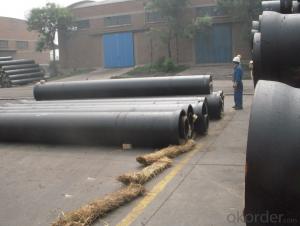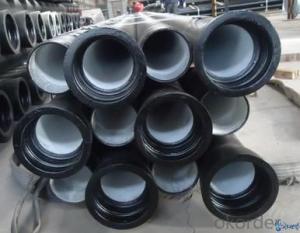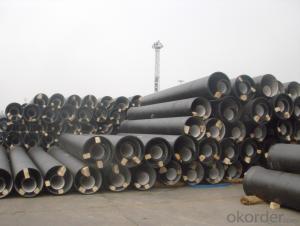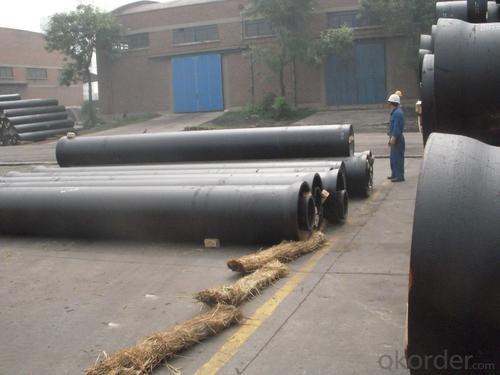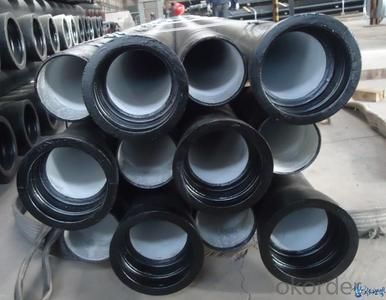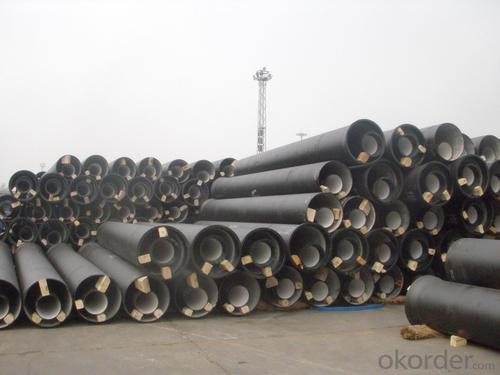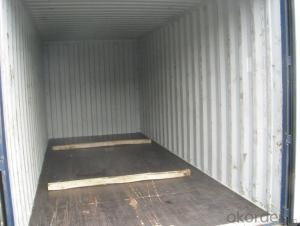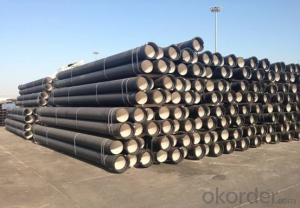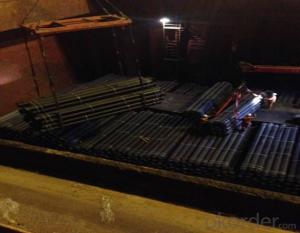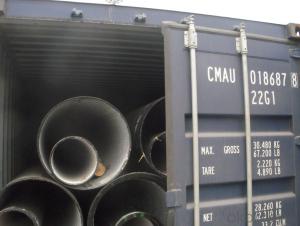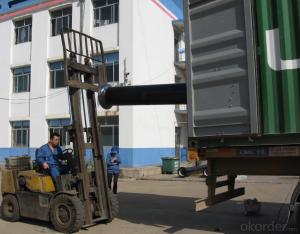DUCTILE IRON PIPES K8 DN1600
- Loading Port:
- China Main Port
- Payment Terms:
- TT OR LC
- Min Order Qty:
- -
- Supply Capability:
- -
OKorder Service Pledge
OKorder Financial Service
You Might Also Like
Ductile Iron Cast Pipe is without any defects compare with tradition casting tech, which has many advantages particularly as follow:
(1) High density. In the "vertical upward casting" process, the melt iron of centre liquid column in center crystallizer is continuously feeding for volume shrinkage caused by condensation tube at outer circumference , which lead to be free of shrinkage porosity.
(2) High purity. When melt iron pouring, the mixed impurities such as gas, dross, sand grain which are lighter than melt iron could be eliminated at furnace mouth, its impossible to enter into the crystallizer through the channel, so the melt iron into the crystallizer is very pure.
(3) Strength with toughness. The cooling speed provided by continuous crystallizer is 30 times than sand casting and 5 times than centrifugal casting, and doesn't produce white iron, the eutectic cell volume of continuous cast iron is one eighth to one tenth compare with traditional cast iron. The density of graphite nodule in ductile iron can reach 300-700 pcs/mm2. Therefore, all reason above improve the strength and toughness of continuous cast iron.
(4) Free machining. The high speed cooling make the hardening phase (such as boride, steadite) not appear like reticular, massive or thick, but diffuse like fish bone and pane in shape, moreover, there are tiny graphite flakes inlaid hardening phase. It's free machining in BrinellHardness the range of 250-300HB. However, the Brinell Hardness of 250 is top limit to common metal materials.
(5) Uniform composition of tube wall. The convection mixing of liquid column caused by marching type drawing in crystallizer make the composition of tube wall well-distributed, and concentration gradient very little.
(6) High productivity. To the wall thickness of tube under 10mm, the speed of continuous casting is 1 meter/min, to the wall thickness of tube under 20mm, the speed of continuous casting is 0.5 meter/min, which is high efficiency that centrifugal or other casting tech couldn't reach.
- Q: Ductile cast iron can replace copper sleeve
- The tensile and compressive capacity of the ball milled cast iron is not as good as that of copper. The hardness of Rongchang graphite copper sheath can reach HB210
- Q: Ductile iron pipe in the direction of it?
- The use of cast iron by adding more than 18 nodularizer, after centrifugal ductile cast iron machine high speed centrifugal cast pipe, called "ductile" (Ductile Cast Iron Pipes), referred to as ball pipe, ductile iron pipe and ductile iron pipe etc..
- Q: Are ductile iron pipes suitable for use in irrigation pivot systems?
- Indeed, irrigation pivot systems can undoubtedly make use of ductile iron pipes. This particular material possesses remarkable strength and durability, enabling it to endure the immense pressures and stress typically encountered in irrigation systems. Moreover, it exhibits resistance against corrosion and can withstand the continuous exposure to water and a variety of chemicals commonly employed in irrigation practices. Furthermore, the smooth interior surface of ductile iron pipes assists in maintaining a consistent water flow and mitigating frictional losses. In summary, the strength, durability, and corrosion resistance of ductile iron pipes render them a dependable choice for irrigation pivot systems.
- Q: How can the ductile iron pipes be treated with corrosion protection?
- Epoxy coal tar coatingThe epoxy coal tar coating is not only suitable for gas pipelines, but also for sewage pipes. It is a two component coating with a high adhesion and a very smooth surface
- Q: Deep well spiral iron pipe, or ductile iron tube?
- Ductile iron pipe is a kind of cast iron pipe. In quality, the spheroidization of cast iron pipes is controlled to be 1-3 (spheroidization rate 80%), so the mechanical properties of the cast iron pipes, ductile iron pipes and finished product libraries can be better improved, with the nature of iron and the properties of steel. Ductile cast iron pipe after annealing, the microstructure is ferrite and pearlite, good mechanical properties, excellent corrosion resistance, good ductility, good sealing effect, simple installation, mainly for municipal, industrial and mining enterprises, water supply, gas, oil etc..
- Q: What is the expected internal lining material for ductile iron pipes?
- The expected internal lining material for ductile iron pipes is typically cement mortar or polyethylene.
- Q: Are there any specific standards or specifications for ductile iron pipes?
- Yes, there are specific standards and specifications for ductile iron pipes. The most widely recognized standards for ductile iron pipes include ISO 2531, EN 545, and ASTM A536. These standards outline the requirements for the material composition, physical properties, dimensions, and testing methods of ductile iron pipes. Additionally, different countries or regions may have their own specific standards or specifications for ductile iron pipes.
- Q: What are the risks in the process of conveying ductile iron pipes?
- Transportation: when transporting pipes by car, two or more pieces of wood should be placed on the platform. The tubes are placed on the wood and fixed with wedges. The pipe out of the car parts shall not exceed the length of 1/4 in vitro. When more than one layer of pipe is installed, the direction of the pipe shall be reversed in each layer, and cushion or cushion shall be added between the two layers of pipes. Finally, the wire rope and cushion are fixed firmly. In the process of transportation, check the risk of falling pipe frequently, check whether the stop wedge is loose, slow down when the road is rough or sharp turn.
- Q: Can ductile iron pipe be used for marine and offshore applications?
- Yes, ductile iron pipe can be used for marine and offshore applications. Ductile iron is known for its high strength and durability, making it suitable for various environments, including those with exposure to saltwater and harsh conditions. It is commonly used in marine and offshore projects due to its resistance to corrosion, impact, and pressure. Additionally, ductile iron pipes have proven to be cost-effective and reliable for transporting fluids in these challenging environments.
- Q: How are ductile iron pipes protected against stray electrical currents?
- Ductile iron pipes are protected against stray electrical currents through the use of various measures such as applying coatings and linings on the pipes, utilizing cathodic protection systems, and implementing proper grounding techniques. These measures help to prevent corrosion and mitigate the impact of stray electrical currents on the ductile iron pipes, ensuring their long-term durability and functionality.
Send your message to us
DUCTILE IRON PIPES K8 DN1600
- Loading Port:
- China Main Port
- Payment Terms:
- TT OR LC
- Min Order Qty:
- -
- Supply Capability:
- -
OKorder Service Pledge
OKorder Financial Service
Similar products
Hot products
Hot Searches
Related keywords
